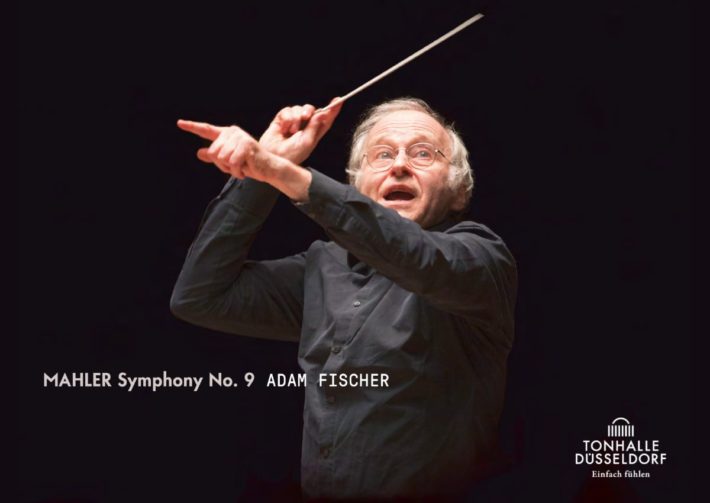Ádám Fischer and his Düsseldorf orchestra are nearing the end of their Mahler cycle, with only Symphonies Nos. 2 and 6 remaining. I began collecting the series with its initial release (Symphony No. 7/2016) and greatly enjoyed each subsequent issue until last year’s recording of the Eighth Symphony, which I found distinctly underwhelming (see review).

While the Düsseldorfer Symphoniker is a first-rate ensemble, it does not have the power and tonal allure of the many world-renown orchestras regularly recording this repertoire. There are certainly moments in this new recording where one might yearn for the power of Berlin’s brass or the opulence of Vienna’s strings. But each of the Düsseldorf releases has offered ample compensation with intelligently conceived, characterful, and deeply felt performances.
The first measures of the opening movement promise much, the various melodic fragments presented with a hushed, confessional intensity. As the fragments coalesce (1’56”), Fischer and his players becomes more agitated and impassioned as they build towards the first thwarted climax (2’50”). Interestingly, Fischer ensures the woodwind have prominence in the overall orchestral timbre, revealing details in the writing that are often lost. Brass adopt a warm, rounded sound throughout that never dominates the orchestral color. String playing is adept and precise, and the orchestra are in complete accord with Fischer.
One of Fischer’s consistent strengths is a firm sense of the music’s structure, and that is readily evident here in his convincing pacing. He also ensures each climax grows in intensity and volume. Yet, the insistence on a well-balanced, beautiful sound ultimately undermines the music’s emotional trajectory. In a written introduction Fischer argues that Mahler was always afraid of death, yet the luminous coloring of the largest climax (16’35”) suggests acceptance rather than fear. Turn to Karajan’s live Berlin reading (CD 1, track 6, 1’00”) and the fear is far more intensely palpable. But Fischer and his players come into their own in the quiet coda, creating an atmosphere of rapt introspection that is deeply touching.
The second movement is essentially three dances, in three different tempos. In Rattle’s Berlin reading each dance brings a new emotional atmosphere, whereas the first two of Fischer’s dances convey a similar, somewhat clumsy, humor. The third dance (track 2, 4’58”) has a beguiling elegance, the Düsseldorf winds contributing a wide variety of color and characterization. The troubled torment of the opening movement is a distant memory in Fischer’s reading.
In the “Rondo: Burleske,” one misses the sheer power of a world class orchestra. Fischer’s tempo, a tad slower than the norm, does allow for a more coherent sense of the movement’s structure. The playing has impressive unanimity but neglects the darker aspects of this music. Rattle, who adopts a similar tempo in both Vienna and Berlin, puts the listener in an emotional rollercoaster of visceral intensity. And in Abbado’s performances, especially his final one in Lucerne, the coda is pushed ever faster, until the music teeters on the edge of the abyss – here the emotional temperature is set far lower.
The final movement goes much like the first: Fischer is at his best in quiet moments, where Mahler orchestrates a chamber music like intimacy. Fischer again proves a masterful guide, building with an inexorable inevitability towards the brutal climax (track 4, 15’02”). The moment is powerful, the orchestra at maximum intensity, and yet it lacks the cataclysmic power heard in the readings led by Abbado, Rattle, and especially Karajan. It is as if Fischer observes the struggle to live from a distance, whereas Karajan is in that struggle, battling to his very last breath. But Fischer and his players are again spellbinding in the final minutes, the music’s fragile, whispered leave-taking fully expressed.
The recording, like the interpretation, is truthful. Capturing a natural concert hall ambiance, solos are not exaggeratedly spotlighted and orchestral balance appears to come from the podium, not the sound engineer. I would very much like to hear this orchestra recorded in Amsterdam’s Concertgebouw or Vienna’s Musikverein; I suspect both rooms would bring greater bloom and richer bass than is heard on their Düsseldorf hall.
If I am less moved by this performance than the other recordings mentioned, it is because I remain unconvinced by Fischer’s more objective interpretation. Other listeners, of course, may feel differently. This will not be a primary recommendation for the Mahler Ninth, but it certainly offers a thoughtful and musical alternative view of this brilliant and profound music.
Mahler – Symphony No. 9
Düsseldorfer Symphoniker
Ádám Fischer – Conductor
Avi Music, CD AVI8553478




















